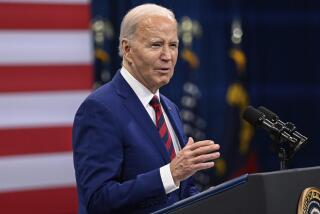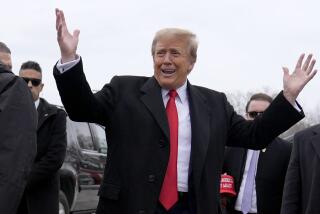PERSPECTIVE ON OPINION POLLS : Have We Too Much Democracy? : Does polling beget pandering? Responsiveness to public opinion doesn’t preclude responsible leadership.
- Share via
Many Americans believe that public opinion polls are today’s political narcotic. Polls explain politicians’ addiction to pandering. The corrupting effect of polling has left few officeholders willing to say “no” to the public’s whims and make the tough decisions necessary to bring the government’s budget under control.
Polling undeniably suffers from pitfalls, but the problems are often exaggerated and misunderstood.
Polls clearly do not provide ideal measures of what the public wants. The structured format of polling questions forces respondents to give unambiguous responses to questions that elicit genuine ambivalence. For instance, when polls ask respondents if they favor or oppose President Clinton’s health-reform plan, the results fail to tell us that many “supporters” actually harbor uneasiness about big government while many “opponents” fear losing their current health insurance.
Polls also have encouraged policy-makers and the media to turn away from alternative and more accurate measures of public interest and commitment. Before polls became prevalent, riots, strikes and other public political behavior were all used as indicators of mass preferences. Today, we judge public sentiment through surveys of public attitudes rather than through overt demonstrations of political behavior. Are the latest polling results a better judge of public commitment to health reform than the dramatic upsurge in the number of strikers willing to put their jobs in danger and hit the picket lines in order to protect their health benefits?
The greatest threat posed by polls is that they equip political leaders to manipulate public opinion into supporting their desired policies. This has been going on for many years. For instance, our research suggests that President Lyndon Johnson used private polls to help shape public opinion toward his policy in Vietnam. Using polls to monitor the impact of his statements, the President exploited his control over military information in order to manipulate public opinion during 1965. An assertive media, though, has made it difficult for politicians to exert this kind of overt manipulation on a regular basis.
Although poll pitfalls are clear, opinion surveys can’t dictate most government policy. Even for politicians eager to pander for votes, public preferences rarely exist at the level of specificity needed for deciding government policy.
Yes, polls help politicians to set priorities among policy issues and to identify bedrock principles. But even the politician anxious to respond to public support for universal health insurance must nonetheless exercise substantial discretion in formulating mechanisms for financing and delivering health care.
It is a mistake, however, to assume that the attack on polling is aimed simply at identifying the inaccuracy or misuse of this tool for surveying public opinion. Instead, the attack on polling raises a more fundamental question: Is America too democratic?
Generations of political commentators have argued that the few who have superior training and knowledge should make government policy for the benefit of the many who are uninstructed. In essence, democracy should begin and end with elections and voting. Underlying the assault on polling is the conviction that today’s government is overly responsive to the majority.
That is wrong. Polling implicitly rests on a dramatically expanded notion of democracy. The purpose of polls is to determine whether government actions respond to the public’s wishes between elections. When policies are habitually at odds with public opinion, this is undemocratic; it is evidence that representatives are pursuing their own desired goals.
The controversy over polling partly stems from the false assumption that responsiveness to public opinion and leadership of it are mutually exclusive. Responding to public-opinion polls does not preclude responsible leadership.
Presidents since John Kennedy have used extensive private polling to formulate proposals that respond to the public’s core preferences. Seizing the bully pulpit, presidents have used the visibility of their office to mobilize public support for their proposals.
One payoff of responsive leadership is to break the logjam in Washington. Congressional deliberation typically entails haggling over details in the quiet confines of committee meetings. Presidents, however, who advocate policies that respond to public opinion can focus the country’s attention on Congress. Normal legislative debate shifts from the back rooms to the front rooms and from details to the most pressing principles of government policy.
The most amazing feature of today’s health-reform debate is that the legislative process continues despite a host of normally fatal obstacles. The secret is that President Clinton’s plan responds to the public’s deep insecurity. The country’s attention is directed toward Congress, compelling even implacable opponents of reform to articulate a principled position. Is this pandering? Or is it democracy in action?
More to Read
Sign up for Essential California
The most important California stories and recommendations in your inbox every morning.
You may occasionally receive promotional content from the Los Angeles Times.










